Thousands of Band-Aids for Millions of Roads
7/4/24 - Part 2 of my series on road ecology and wildlife crossings
Hello everyone:
As always, please remember to scroll past the end of the essay to read this week’s curated collection of Anthropocene news.
Now on to this week’s writing:
Why did the fox cross the road?
Because for the fox there is no road. There is only habitat, safe and unsafe.
“A better question,” Ben Goldfarb reminds us in Crossings: How Road Ecology is Shaping the Future of Our Planet, is “Why did the road cross the land?”
What we’ve built, and what we do, does not mean to other species what it means to us. Our world, for them, is weird and dangerous and full of hard, diminished places. It does not communicate in recognizable ways. Our predatory cars and trucks, for example, do not scent-mark their hunting routes to indicate territory, or to say that they are a threat to anyone that crosses their path.
There are many, many things that make me want to “rethink” civilization (this is a polite term for what I mean), but roadkill is high on the list. For example, how hard is it to slow for, or avoid, a turtle? And yet this spring, in the weeks before I began rewriting this three-part essay on road ecology, I’ve helped five turtles cross the road (two snappers, two painted, and one eastern musk), but removed the smashed carcasses of three painteds, and passed by several other forlorn chelonian bodies.
I’ve also seen this spring the usual assortment of dead squirrels, chipmunks, and porcupines, many this year’s young. A dead snake here, frogs and salamanders there. Just last week I found a pancaked bullfrog on a private road with just four houses on it, speed limit 10 mph.
One body that haunts me still is that of the gorgeous gray fox you see in the image above, from a few years ago. It’s the only one I’ve ever seen, live or dead. Gray foxes are beautiful marvels. They climb trees, up to 50 feet high, and they’re strong swimmers. They can run up to 28 miles per hour. Unlike other canids, they have retractable claws. They are the oldest of fox lineages, stretching back 10 million years.

Every 26 seconds or so in the U.S., on average, a car hits a large animal.
That figure is based in the estimated 1 to 2 million collisions per year in the U.S. with deer, moose, bear, elk, etc. It does not include the tens to hundreds of millions of smaller animals, like the gray fox and the turkey, killed in collisions that are rarely reported, or the smallest, like mice, voles, songbirds, and insects, for whom there is no accounting whatsoever.
In building the modern, human-centered world, we’ve built transport systems that make useless the ancient evolutionary tactics animals use to defend themselves. As Ben Goldfarb writes in Crossings,
Consider the self-defense tactics of our commonest creatures... Skunks spray, badgers hiss, opossums play possum. Porcupines bristle. Tortoises withdraw. Armadillos, oddly, jump. Timber rattlesnakes freeze, confident in their venom. For thousands of years these stand-your-ground strategies fended off coyotes and hawks, but against automobiles they were worse than useless. Even those animals that did flee were addled by the speed of cars. Many birds depend on a “distance rule” to decide when to retreat from danger, meaning that they take flight based on how far away a threat is, not how fast it’s going… Cars hijacked their victims’ own biology, subverting evolutionary history and rendering it maladaptive.
Senses and defenses are the animals’ failing. Ours is ethical.
“At what point in our evolution as a society,” asks Ted Zoli, the bridge engineer and MacArthur Fellow I introduced last week, “did it become okay to run over wildlife?”
Our ethics are improving. There has been a surge in the construction of wildlife crossings. This work is rooted in road ecology, which I think of as the Anthropocene science of the interaction between roads, the natural world, and our social priorities.
In the U.S. and elsewhere, human populations are spread weirdly across our built urban, suburban, and rural landscapes, each with their own paved and gravel habitat-splitting kill zones. The good news is that because much of our infrastructure is aging while also facing new challenges posed by a changing climate, we can, to borrow a phrase from the Biden administration, build back better. Given the $8 billion cost to society, the 200 human deaths (and 26,000 injuries), and the countless animal lives lost, every year, it makes both fiscal and moral sense to address all of this at the same time.
The Bipartisan Infrastructure Law passed by the Biden administration provides a real opportunity to build on the momentum, as the Center for Large Landscape Conservation (CLLC) explains here:
One of the most exciting elements of this historic legislation is a $350-million, competitive grant program called the Wildlife Crossings Pilot Program. This is the first-ever dedicated federal funding for structures that help fish and wildlife safely pass over and under roads while reconnecting habitat. Additionally, these projects are now eligible for funding from more than a dozen other transportation programs under the Bipartisan Infrastructure Law.
To help accelerate this process, the CLLC and other organizations created Crossings for Wildlife, a website devoted to helping “local communities and municipalities, state departments of transportation, Tribes, and federal land managers to help plan, develop, and maintain road and river crossings that seek to connect fish and wildlife habitats and prevent wildlife-vehicle collisions.” If your community needs to build crossings, let them know about this resource.
One earlier example of this good work can be seen near Kremmling, CO, where a complex of overpasses, underpasses, animal off-ramps (to escape the highway if they manage to get onto it), and 10 miles of fencing were built. They reduced wildlife collisions by 90%.
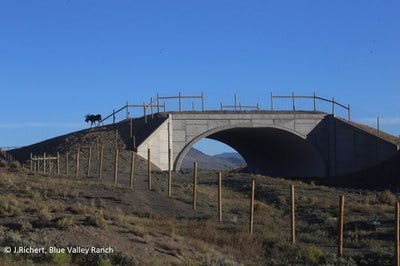
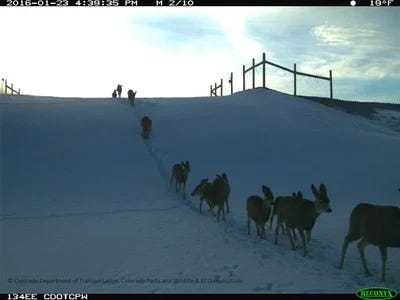
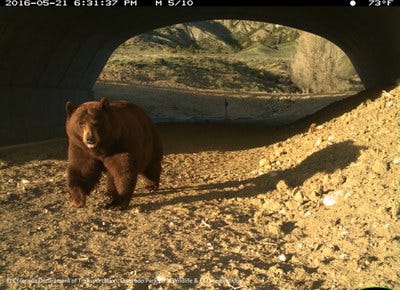
Even better, the People’s Way Project on Rte. 93 through the Flathead Indian Reservation in Montana built 41 animal crossings to benefit a multitude of species, from grizzly to trout. “The road is a visitor,” the tribes reminded the Dept. of Transportation as they provided guidance for the project, “and it should respond to and be respectful of the land and the Spirit of the Place.”
Elsewhere in Montana, the state highway and fish/wildlife departments have signed an agreement to incorporate wildlife concerns into transportation planning. In Idaho, the state transportation department also teamed up with fish and game staff as it rebuilt 17 bridges, improving habitat and passage for aquatic and terrestrial species. In Wyoming, a crossing complex for pronghorn antelope and mule deer lowered collisions by 80% and will pay for itself in less than 20 years. And in Utah, the Parleys Summit Overpass on a stretch of highway known to locals as “slaughter row” was quickly adopted by wildlife, surprisingly so, given that it’s only 50 ft. wide and 320 ft. long. (Here’s a quick video montage of animals using it.)
And in California, the Wallis Annenberg Wildlife Crossing, the largest in the world – 165 ft. wide, over the ten-lane Highway 101 – is being built just 35 miles outside of Los Angeles, to link the Sierra Madre Range with the Santa Monica Mountains for the benefit of mountain lions, bobcats, coyotes, and many other species.
You can read summaries on these and many more in a pdf download from ARC (Animal Road Crossing), “Wildlife Crossing Success Stories in the Western States.” Here is a good short documentary (and a construction time-lapse) on another of those success stories, a decade-long effort in Nevada to create passage for mule deer migration.
Likewise, up in Canada’s Banff National Park, a comprehensive array of 44 crossings over and under the TransCanada Highway have not only kept wildlife off the pavement and humans out of the hospital, but they’ve demonstrably improved the genetic diversity of the black and grizzly bear populations, not to mention providing habitat connectivity for moose, elk, wolves, foxes, mountain lions, lynx, and others who have become accustomed to the crossings.
I find it somewhat revelatory that predators and prey, ungulates and rodents, canids and big cats, will all willingly move out into the open terrain of a narrow bridge over the constant rush of traffic beneath them. But then again, before the bridge they were moving out into the much stranger terrain of the road itself.
It helps that the overpasses are built with natural landscaping to provide visual continuity with the terrain on either side. Where possible, this is happening with underpasses as well. Underpasses meant for both wet and dry passage are now sometimes incorporating a “critter shelf” on the side so terrestrial species can keep their feet dry while fish, otters, frogs, or alligators splash through the main channel. Here’s a nice sketch of some crossing options from Highway Crossing Structures for Wildlife: Opportunities for Improving Driver and Animal Safety, a guide produced by ARC and the Western Transportation Institute for the U.S. Forest Service:
What all of these projects have in common, other than being placed in crucial locations and designed for the needs of wildlife, is a “fencing and crossing” strategy. Miles of serious fencing block access to the road while funneling wildlife toward the crossing.
This whole-landscape perspective underlies the mission of the Center for Large Landscape Conservation, which funds ARC. Decades of peer-reviewed reports by conservation biologists confirm that the single most important recommendation for protecting biodiversity, particularly in the face of a changing climate, is to ensure that wildlife habitats are connected on a landscape scale. The CLLC’s Corridors and Crossings program acknowledges first that “animals need to move,” and that in doing so “they shape and maintain the landscapes in which they live.”
In other words, landscapes need wildlife as much as wildlife needs landscape.
So far I’ve focused on work in the western states. Much of the attention-grabbing innovative work in the U.S. is being done there, largely because those states are trying to protect herds of large migratory species and charismatic predators like bear and mountain lion who require extensive territories. And these states still have large, relatively intact landscapes (national parks, national forests, monuments, and wilderness areas, for example) to be connected if the killing highways that separate them can be bridged. This is less true in the eastern U.S., but I’ll say more about that in a moment.
Elsewhere in the world wonderful projects are being built. Wild asses in Mongolia can now cross the Trans-Mongolian railway for the first time in seventy years. Sweden announced plans to build a dozen reindeer viaducts for the herds that the Sami move through the north of the country. Ireland is working on plans to reduce collisions with barn owls. The Netherlands, ahead of the curve, has hundreds of crossings, including dozens of large “ecoducts”. Underpasses in Mexico’s Yucatan Peninsula provide safe passage for jaguars. Annual swarms of migratory red crabs on Australia’s Christmas Island are now funneled toward amazing little underpasses and overpasses.
The Center for Large Landscape Conservation is working in Asia to promote wildlife-friendly linear infrastructure (roads and rails), and they are partnering with the International Union for the Conservation of Nature (IUCN) to produce guidelines for nations to preserve or create ecological connectivity. In Europe, similar concepts exist in Wildlife & Traffic: A European Handbook for Identifying Conflicts and Designing Solutions.
Clearly, we’ve entered a new age of wildlife crossings. It’s still a smattering of Band-Aids for millions of miles of road, but it amounts to a significant cultural shift that can be filed under Good-Things-Being-Done in response to the global biodiversity crisis. It’s early days yet, but governments are incorporating the needs of wildlife into the way they plan and construct transportation networks. That’s important systemic change.
But what about nonmigratory species, or wildlife with small territories, or animals that aren’t as charismatic or threatened or valued for hunting? What about all the millions of small animals we hit that don’t cause economic damage? What about entire landscapes composed of these species which live in small habitats alongside millions of miles of unfenced roads? These questions are especially relevant for those of use who live in the eastern U.S.
I’ll address these questions next week, in the third and final essay in this series.
I’ll close out this week with another fox anecdote. A few years back, there was a young red fox here in our neighborhood who had decided that hunting along the road in broad daylight was a fine idea, taking advantage of the easy walking alongside the rodent-filled edge habitat of our linear infrastructure. Twice over a couple weeks I watched it trot down the southbound lane by the house here and ignore oncoming vehicles until becoming surprised, and a bit insulted, as drivers stopped to try to scare it off without success.
Finally, I ran out into the road myself, barefoot, and chased the fox off the road and into a field where, I swear, it turned to look at me with an expression that said What did I ever do to you?
Thanks for sticking with me.
In other Anthropocene news:
From Mongabay, a shortcut to stopping the sixth mass extinction. A new study finds that by focusing conservation efforts on just 1.2% of the planet’s land surface (mostly in the Philippines, Brazil, Indonesia, Madagascar and Colombia), where the majority of rare and endangered species live, we can blunt the worst of the extinction crisis. For perspective, the estimated cost of these efforts is about $34 billion a year, which is 16% of Elon Musk’s ridiculous, unnecessary, unwarranted wealth.
From ProPublica, an investigative report into the various ways the oil and gas industry successfully resists state efforts to enact and enforce rules forcing the industry to pay for the plugging of old wells. In many states, there’s a multi-billion-dollar shortfall in funding that the industry has little interest in helping with.
From Yale e360, an interview with a mycoremediation expert who is revolutionizing the use of fungi and plants to clean up brownfields and other toxic sites, and teaching environmental justice and tribal communities how to do it on their own.
From the Verge, a tire company is making a big and important bet on designing more efficient and less polluting tires for the EV market. ENSO (a UK company with an Icelandic CEO) understands that EVs carry more weight and offer more horsepower, which means more particulate emissions and shorter tire life. Their new tires offer increased efficiency, reduced wear, and reduced cost.
From Sustainability by Numbers, an interesting post debunking the myth that only 5% of lithium-ion batteries are recycled. What’s interesting is not so much correcting that factoid, but how Ritchie explains the origin of this “zombie statistic” and how it came to misinform discussion for many years.
From Grist, the global seafood industry now harvests more farmed fish than wild-caught fish. The article explores whether that’s a good thing.
From Nautilus, a new study finds that the noise we make in wild places has far more impact on wildlife behavior than we realize. In Wyoming’s Bridger-Teton National Forest, researchers set up game cameras and speakers that played different human recreational noises when an animal appeared. The sounds of large groups of chatty hikers and mountain bikers were the most likely to make animals flee. And the impact could last weeks, with the frightened animals slow to return to that part of the forest.
From Emergence, an interview with the writer David James Duncan about his new novel, Sun House, a deeply spiritual imagining of a society that answers the question of how we create a new consciousness that will allow humans to exist in right relationship with the land. This interview is my introduction to the book, which I have not read, but I know Duncan’s writing and he is amazing. Here’s Duncan describing the book’s intent:
“Though I’d seen countless op-eds calling for a change in consciousness if humanity is to survive, I’d seen zero op-ed descriptions of what this consciousness looks, feels, tastes, sounds, and lives like as it addresses inescapable biological and spiritual realities with the love, truthfulness, and justice they demand.”

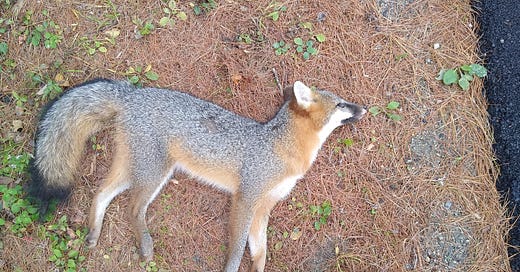



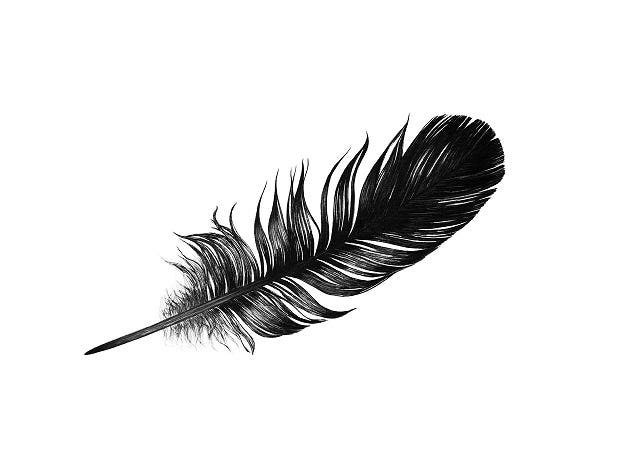
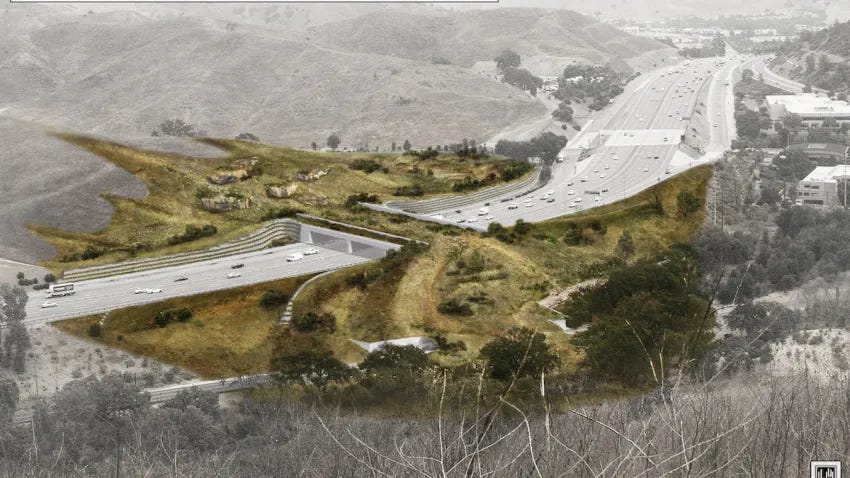
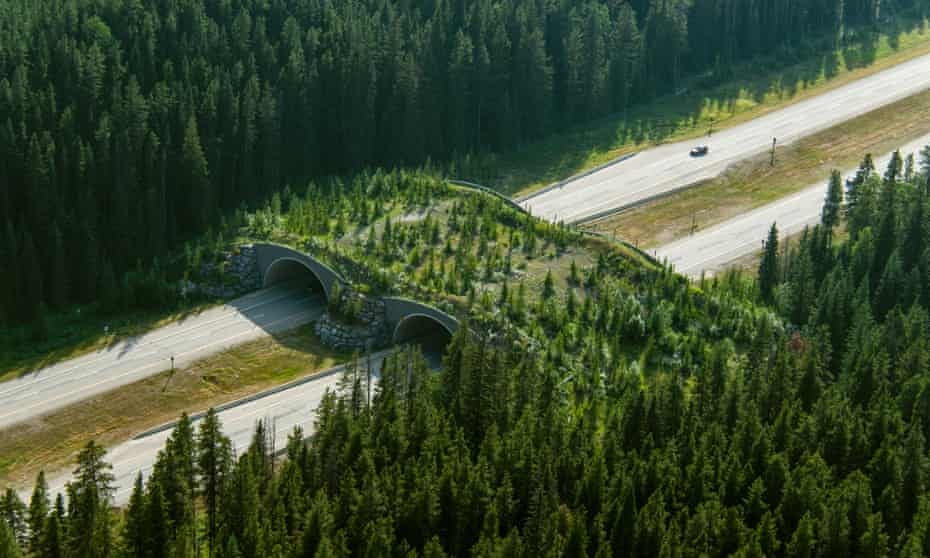

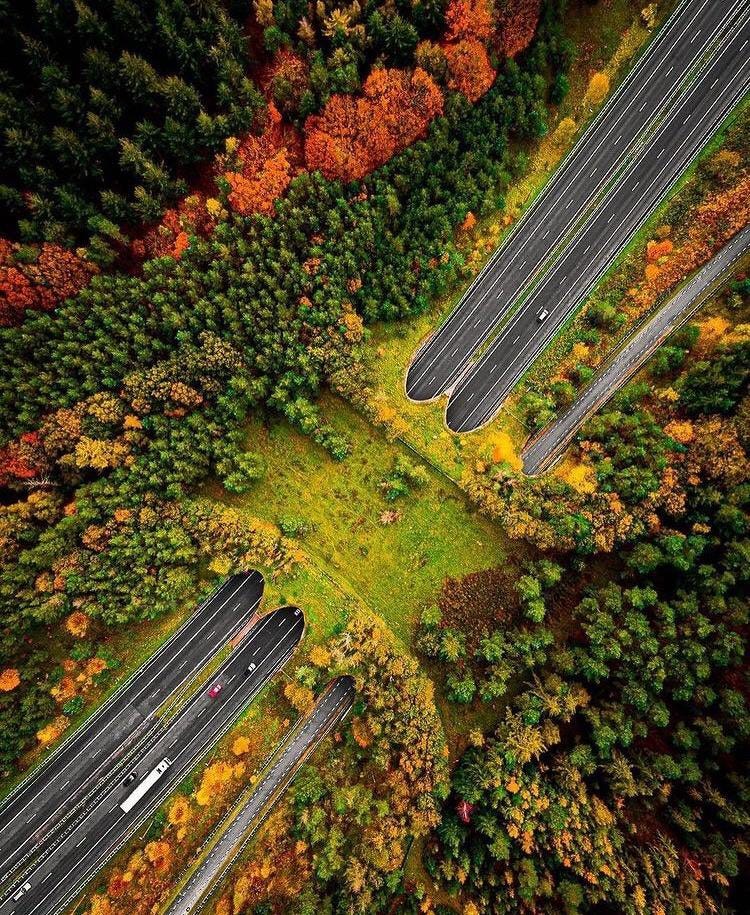
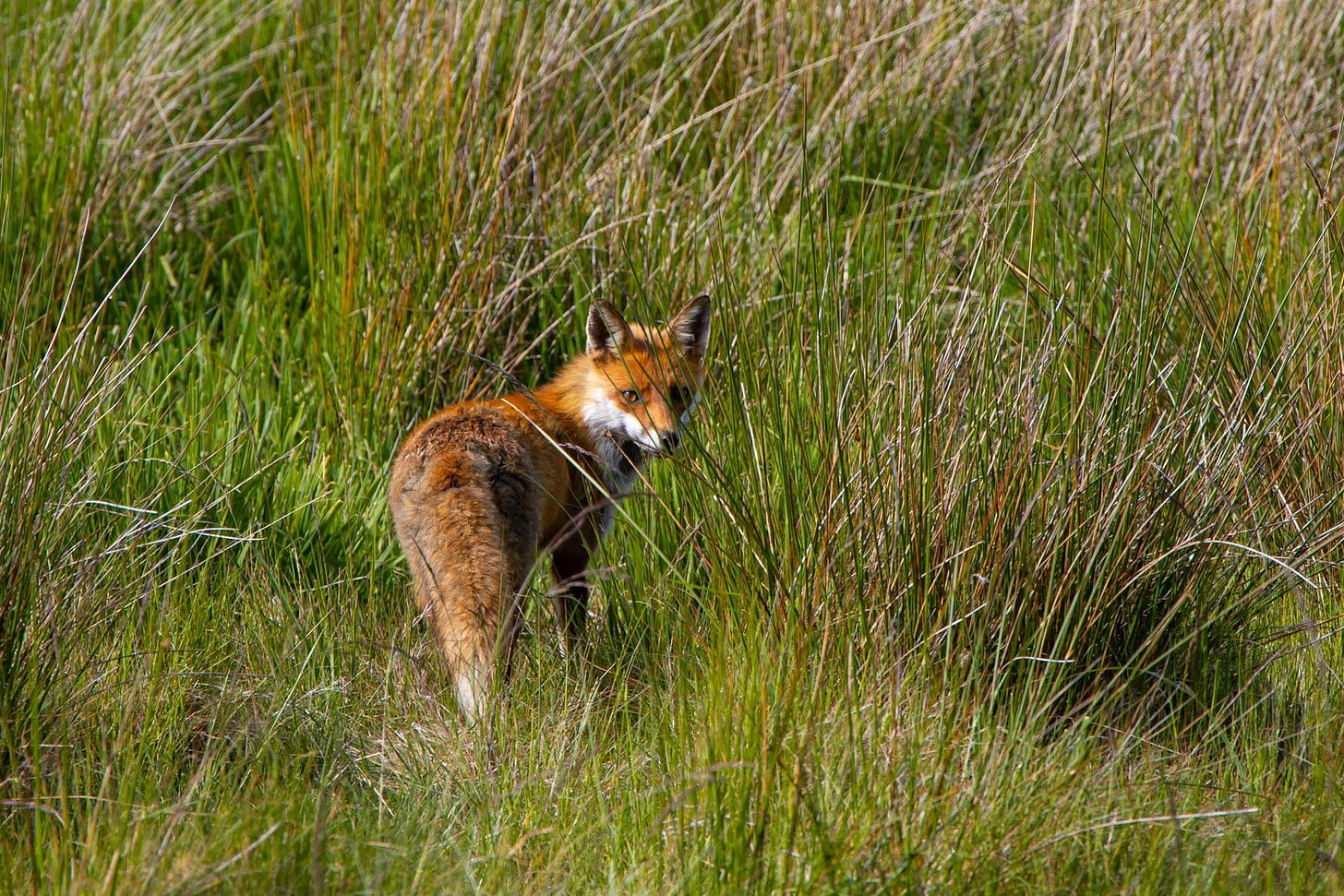
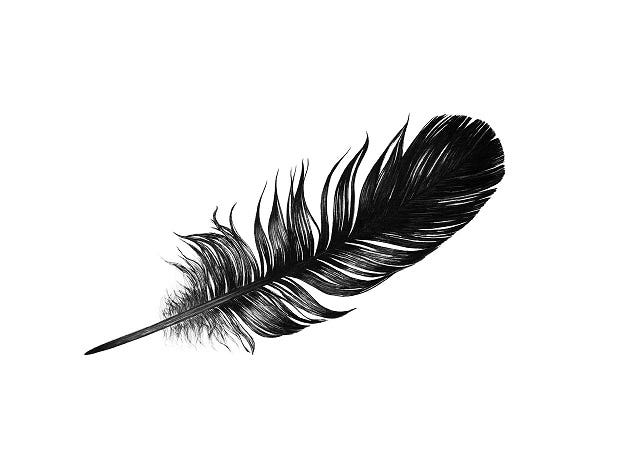
Jason, thank you.
As an update to my comment in your Part I:: Our two mile dirt road is populated by black bears, deer, black snakes, squirrels and humans with many opinions -- few who consider the road as anything other than a way to get to where they want to go. A motion to pave the road was up for debate at the Road Association meeting last Saturday. It was well attended and contentious. For now, 85% of my neighbors voted NOT to pave. Phew.
There are mountain springs that run under the big hill going up. I volunteered to map the water sources that run under and around the road area. From there, I will venture into animal habitat and crossings. Thank you for doing so much of my legwork by providing the resources.
By the way, I mentioned your Substack, in an interview with Julie Gabrielli, as one of my essential resources. Thank you, always. Katharine
I've long believed that it is just as well we do not know the full toll roads - let alone the automobile culture as a whole that they are a byproduct of - have taken. It would be sickening beyond all fathoming. I grew up in a region where entire populations of large reptiles were extirpated by roads, and they were the last of what original wildness hadn't already been eradicated. I now live not far from Banff Park with its wildlife overpasses, as you mentioned. I am very happy to see these band-aids as you call them and as they indeed are, band-aids on a cut throat. I can't avoid seeing deeper however, to the math that underwrites all this. That is, how only the excess wealth generated by the oil economy gives us the financial option to pursue these things. An economy completely dependent on growth to function to this degree, with economic growth being 97% correlated to how much fossil fuel we burn in a given year. In other words, for one thing, the more means we desire to have to build overpasses, the more vechicles we must put out on those roads. When I take this stuff into account i see us not so much as something intentional working itself out, but as a train with the driver being an illusion - they are not really there, there is no driver - derailing into a colossal accident in slow motion. Given the contract, i have often wondered what exactly we think the day we are saving these species for looks like? (Assuming we are saving anything, the game is still in-play, "saving" may be the wrong word.) I guess it looks like today, we are saving them for right now. The math suggests we aren't going to have much of a tomorrow. But maybe that's the answer - WE aren't, but they therefore will.